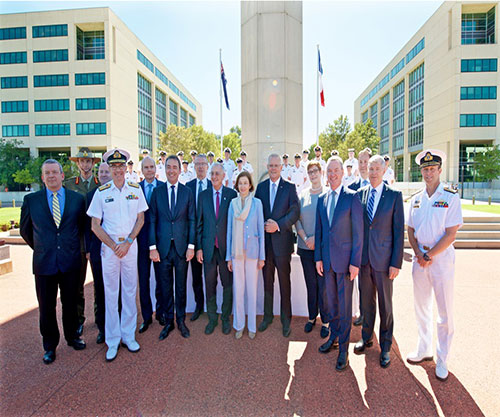
Naval Group said in statement that it took note of the decision of the Australian authorities to acquire a fleet of nuclear submarines in collaboration with the United States and the United Kingdom following their comprehensive capability review.
The Commonwealth decided not to proceed with the next phase of the program. This is a major disappointment for Naval Group, which was offering Australia a regionally superior conventional submarine with exceptional performances. Naval Group was also offering Australia a sovereign submarine capability making unrivalled commitments in terms of technology transfer, jobs and local content.
For five years, Naval Group teams, both in France and in Australia, as well as our partners, have given their best and Naval Group has delivered on all its commitments, the statement added.
The analysis of the consequences of this sovereign Australian decision will be conducted with the Commonwealth of Australia in the coming days, the statement concluded.
Meanwhile, France accused U.S. President Joe Biden on Thursday of stabbing it in the back and acting like his predecessor Donald Trump after Paris was pushed aside from a historic defense export contract to supply Australia with submarines, Reuters reported.
The United States, Britain and Australia announced they would establish a security partnership for the Indo-Pacific that will help Australia acquire U.S. nuclear-powered submarines and scrap the $40 billion French-designed submarine deal.
“This brutal, unilateral and unpredictable decision reminds me a lot of what Mr. Trump used to do,” Foreign Minister Jean-Yves Le Drian told Franceinfo radio. “I am angry and bitter. This isn’t done between allies.”
In 2016, Australia had selected French shipbuilder Naval Group to build a new submarine fleet worth $40 billion to replace its more than two-decades-old Collins submarines in what many observers called the world’s largest single arms export deal.
Just two weeks ago, the Australian Defense and Foreign Ministers had reconfirmed the deal to France, and French President Emmanuel Macron lauded decades of future cooperation when hosting Australian Prime Minister Scott Morrison in June.
“It’s a stab in the back. We created a relationship of trust with Australia and that trust has been broken,” Le Drian said.
The French Embassy in Washington said it was cancelling a gala event related to French-U.S. ties last Friday following the day’s events.
France’s ties with British Prime Minister Boris Johnson have also soured over the UK’s exit from the European Union.
Washington’s actions in Australia are likely to further strain transatlantic ties, political analysts said. The European Union was due to roll out its Indo-Pacific strategy on Thursday and Paris is poised to take on the EU presidency.
U.S. Secretary of State Antony Blinken on Thursday said France was a “vital partner” in the Indo-Pacific region and that Washington would continue to cooperate with Paris, comments that appeared aimed at calming French anger.
Morrison said Australia looked forward to continuing to work “closely and positively” with France, adding: “France is a key friend and partner to Australia and the Indo-Pacific.”
It is the second setback to French defense exports in three months after Switzerland spurned Dassault’s (AVMD.PA) Rafale to buy U.S.-made Lockheed Martin (LMT.N) F-35 fighters.
Analysts said the loss of the much bigger submarine contract was a significant blow to France, whose experienced arms sales machine had gone all out to wrest the submarine deal from likely winner Japan under then Defense Minister Le Drian in 2016. Germany had also been in the race.






Be the first to comment